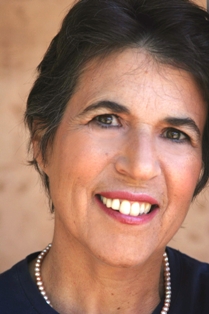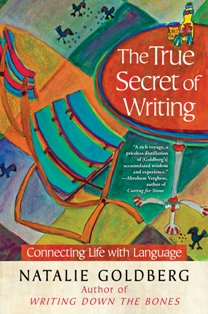
One perk of blogging about women, food and body image is interviewing inspirational women, then sharing that inspiration with you, dear reader. Recently, I was lucky enough to take inspiration from one of my all-time favorite writers: Natalie Goldberg, who writes about writing and has interesting views on the meaning of life. Writers may be her biggest fans, but you don't have to fancy yourself a writer to delight in Goldberg's life insights.
If you've never read Goldberg, you don't know what you're missing. Her bestselling book on Zen and the art of writing, Writing Down the Bones, has introduced millions to meditative writing practice. When I learned that the mindful author had written the long-awaited follow-up book to that 1986 classic, I jumped at the chance to set up a Skype interview. Only problem, she had never reached out and Skyped someone. Happily, the beloved writing teacher was willing to learn if it might help promote her new book, The True Secret of Writing.

The moment my new Skype contact started sharing her writing secrets, there was no question that she was none other than that delightful, insightful author who's been speaking to me from the printed page for a quarter century. Goldberg's lyrical self-expression is unmistakable. Written or spoken, her poetic take on deep snow, grocery lists and deserted cafes infuses wintry bleakness with the bright hope of early spring. But unlike her writing voice, her speaking voice reveals the Santa Fe immigrant's Long Island beginnings, especially when she waxes poetic about chocolate or, as native New Yorkers say, "chaw-klit."
To hear what Goldberg has to say about her love affair with writing, be sure to watch the interview outtake. To learn her true secret, read on. What follows are questions and answers from that recent interview.
Q. The title of your new book started as an inside joke, and yet, you've made a serious effort to share your writing secrets. What is THE true secret of writing?
A. You're not going to like it because nobody likes it. You don't have to go to therapy or buy a studio. Basically, the most raw, deep truth is shut up and write. There's no such thing as a writer's block. If you're having trouble writing, well, pick up the pen and write. No matter what, keep that hand moving. Writing is really a physical activity.

Q. Your secrets aren't just about writing, they're about living, breathing and eating. What's your eating secret?
A. Like writing, if you want to lose weight, it's very austere. You have to stop eating so much. Now that sounds simple, but everything comes up there: "I'm hungry. I'm scared. I eat because I want Oreo cookies and I know they're not good for me." Just stop eating so much.
Q. Your definition of meditation is more flexible than most. Besides sitting and walking meditation, you recommend writing, too. What's the difference between keeping a journal and writing meditation?
A. There's no difference to me. Whether you're keeping a journal or writing as a meditation, it's the same thing. What's important is you're having a relationship with your mind. We live in discursive thinking, and what we want to do is drop below to first thoughts, which is wild mind and true energy.
Q. Researchers have found that writing improves overall health, but bad body image and eating habits, not so much. In the decades you've been teaching writing, what have you found?
A. With writing practice, I can't imagine it not helping. You stand up straighter, you love yourself, you're saying the truth of who you are. You don't have to hide anymore or starve yourself. You realize your own richness.
Q. Have you ever struggled with food or body image?
A. Not really, but my mother did terribly. She was always on a diet. I don't remember her ever enjoying a meal. It's heartbreaking. Women are wonderful, but they get so caught up about their body. We need to unhook from worrying so much. When I don't feel good, I look in the mirror and think I look fat and miserable. But when I feel good and whole, I'm not worried about my body because I'm living in it. It doesn't become an object.
Q. What's the connection between chocolate and writing for you?
A. Sometimes I don't want to write and I seduce myself with chocolate. But slowly, over the last year, I've gained 10 pounds. Because of writing and meditation, I know not to beat myself up. So I'm going to do what I said to do -- start eating less. I'm eating more fruits and vegetables and not so much chocolate.
Q. You also write about your friend Geneen Roth. How has Geneen influenced you?
A. I respect tremendously what she does with food. Of course, I've read her books. I think she's influenced me, but I feel aligned with her, so it's not quite "Oh, I didn't think of that." When I ask her things or just listen to her, it affirms what I already know.
Q. Anything else you want to say?
A. Women need space and silence. We too quickly give away our energy. There's something about holding that richness. Maybe if I hold that richness in silence and put it on the page, I won't need so many chocolate bars. I'll have some richness in there.
Jean Fain is a Harvard Medical School-affiliated psychotherapist specializing in eating issues, and the author of "The Self-Compassion Diet." For more information, see www.jeanfain.com.
For more by Jean Fain, L.I.C.S.W., M.S.W., click here.
For more on wellness, click here.